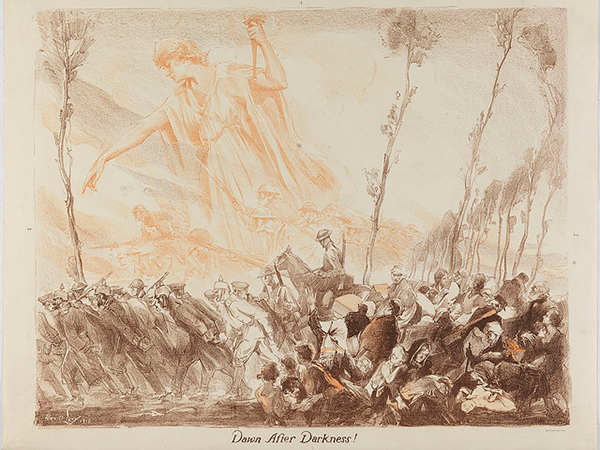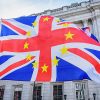
This summer will mark the centenary of the appearance of the first volume of Oswald Spengler’s influential The Decline of the West (Der Untergang des Abendlandes), first published in 1918, when the First World War was in its death throes prior to the November armistice. One hundred years later there is again a widespread sense that we are witnessing the decline of the West –and even more so the relatively liberal world order that it erected– albeit in relative terms and in a way that is little connected to the causes that Spengler identified. The German thinker, who rejected the Eurocentric division of history into ancient, mediaeval and modern, viewed as inexorable, and almost mechanical, the transition of what he called the ‘high cultures’ (he saw ‘civilisation’ as the start of the decline) through four essential phases: youth, growth, flowering and decline. And in 1918 it was the latter phase that had overtaken the West, one of the eight high cultures he identified. These were the Babylonian, Egyptian, Chinese, Indian, Mesoamerican (Aztec/Mayan), Classical (Greek/Roman), Arabian and Western, or European-American.
It is a view of ‘civilisation’ not too far removed from the one put forward by Samuel Huntington with his ‘clash’, but very different from that of the Iranian-Canadian philosopher Ramin Jahanbegloo. The latter, in his recent The Decline of Civilization, 100 years after Splenger, goes further. He believes that we are witnessing a process of the ‘de-civilisation’ of society, which does not mean the absence of civilisation, but rather ‘a senseless and unreflecting state of civilisation’, with an ‘empathy deficit’, not only in the West but in the world in general.
Spengler was wrong, clearly, but in an interesting way. World War One (1914-18) led to the rise of the US to global pre-eminence and later to its superpower status after World War Two (1939-45), a period of internecine European war and conflict on a worldwide scale that ended with the European powers losing their empires. Meanwhile the world saw the emergence and disappearance (1917-91) of the Soviet Revolution, the USSR and the Cold War, the latter won by the West, although perhaps not as definitely as was thought. And while the West was winning against the USSR, China resurfaced from 1982 onwards thanks to Deng Xiaoping’s Four Modernisations. And since the watershed of 1989 –marked by the fall of the Berlin Wall and the Tiananmen Square massacre– a nationalist version of Russia has been resurrected that the West was incapable of drawing in and incorporating when it had the chance. Above all, China, with its Communist party regime and mixed economy, is carving out a place in the modern world that is even more important than it had prior to 1870, in part because it has been able to take advantage of the liberal order and Western-led globalisation.
Some, such as Francis Fukuyama, thought they had divined the end of history in the West’s triumph over the Soviet system, with the universal victory of the liberal-democratic model, although prior to him the same idea had been proposed by Hegel and his follower Alexandre Kojève. Indeed, during the post-war and Cold War period, the West succeeded, thanks to the economic and military might of the US, in erecting this liberal world order for large swathes of the planet, which continued in the phase of unipolarity. Diagnoses of its decline are now starting to proliferate in the West itself, vide Richard Haas, for whom the decision of the US under Trump to abandon the role that it has played for more than seven decades ‘marks a turning point’. Does the decline of the liberal world order entail the decline of the West? Or is it the other way round?
At the same time, as pointed out previously in this blog, there are instances in the West where democracy and the rule of law are in jeopardy (Turkey and Poland being cases in point) and disruptive populist movements are on the rise. Further afield, authoritarian regimes such as China and Russia are strengthening themselves, with their own political and economic models, whereas Western countries shy away from the task of defending their values and principles, even casting the latter in doubt. Various recently published books (by William Galston and Timothy Snyder, for example) raise the question of whether it is not so much the liberal world order that is under threat, as the very existence of democracy as it is understood in the West.
The liberal or Western world order is not now simply being questioned by ‘the others’, but by those who constructed it, led by the Trump Administration in Washington, in reaction to what they see as the excesses of globalisation. However, there remain many elements of this order from NATO to the EU, via the Bretton Woods institutions (the International Monetary Fund, the World Bank and the former GATT, now the World Trade Organisation), in which China participates. But Beijing, and other actors, are trying to change this order while simultaneously constructing another one alongside.
The WTO is in the spotlight, with the Trump Administration assailing it (and China has exploited it). The trade war being triggered by the US and China could, if it takes hold, descend into a self-perpetuating spiral from which no-one will be immune, because these days the world is interdependent. Years ago, well before globalisation and global value chains were discussed, in their famous book Power and Interdependence (1977) Robert Keohane and Joseph Nye analysed what they term a ‘complex interdependence’. And this complexity is rendered even more dangerous by being disrupted.
The West has currently outlived Spengler’s book by 100 years. But it is forfeiting, or is going to forfeit, its dominance, particularly in the context of the rise of China. Even within the West there are tensions between the great protector and largely stabilising US –which was also the main instigator of the globalisation it now seeks to hinder– and some of its partners and allies, which are reluctant to recognise that the US has changed and hope that Trump will prove a passing phenomenon. But clearly if it shoots itself in the foot the West will accelerate its decline, even if it is not for the reasons divined by Spengler, convinced as he was that it was possible to foresee what would come to pass. As the saying goes: making predictions is always tough, especially about the future (a quip attributed to various fathers). It is even difficult to predict the past, because as Antonio Machado wrote, ‘neither the past nor the morrow have died, and yesterday has not been written’.


